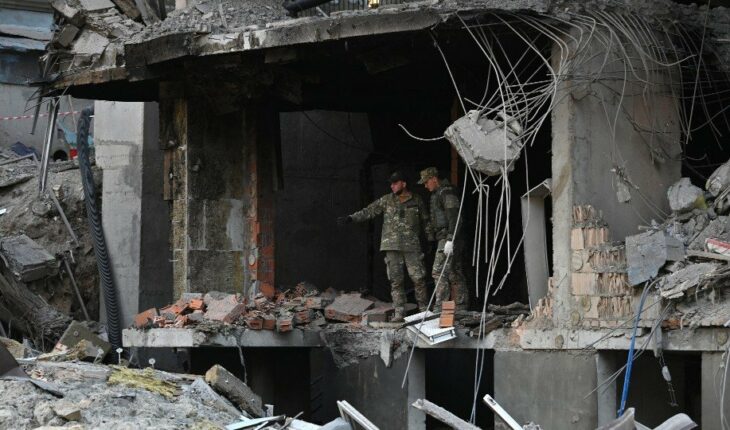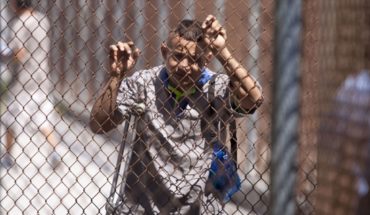When he closes his eyes, Vitaly Zivotovsky appears to be prisoners with white bags on their heads like those brought home by Russian troops at gunpoint and with their hands tied.
His home in the city of Bucha, now synonymous with the atrocities of which Ukraine accuses the Russian forces that occupied the region in March, became a base for some Moscow soldiers and a hellish prison for him, his daughter and his neighbor, whose husband was killed.
“We trembled not because of the cold, but because of fear, because we could hear what the Russians were doing to the prisoners,” Zivotovsky explains in front of his now-burned house. “We had no hope,” he admits.
The city northwest of Kiev drew international attention for the discovery of at least 20 bodies in civilian clothes on a stretch of Yablunska Street (apple tree in Ukrainian).
For the locals who witnessed it and survived, the memory will haunt them forever.
“What can you feel? Just horror,” says Viktor Shatilo, 60, who documented the violence from his garage window with photographs. “It’s a nightmare, just a nightmare,” he adds.
Before Russian troops captured Bucha, just days after the start of the invasion, this was a small but ever-expanding city on the outskirts of Kiev. It then became a key trophy on the way to the capital.
As soon as the war began, a Russian armored vehicle broke into Zivotovsky’s garden on February 27 and began firing on a block of neighboring apartments, causing a fire on the upper floors.
Read: Russia and Ukraine: Bodies left and tank graveyard in Bucha after withdrawal of Russian troops
But it wasn’t until a week later that troops took control of his home and locked him and his 20-year-old daughter Natalia in the basement, warning them they would be killed if they tried to leave without their permission.
“Let him go out or throw a grenade”
Soldiers ate, slept and ran a field hospital and operations center in the house built by Zivotovsky’s family, just a minute’s walk from Yablunska Street.
His only goal was to save his life and that of his daughter, so the 50-year-old man addressed the soldiers in Russian and told them about his family and his faith in God to humanize himself.
It wasn’t long before he saw soldiers driving a hooded detainee into his home, a scene he heard or saw on at least seven other occasions, all followed by interrogations, beatings and screaming.
Traces of the occupation are in every corner of his destroyed house: Russian rationing packages, a camouflaged combat manual and a wooden bat with the word “MORAL” scrawled by hand in Russian.
In the middle of their ordeal, the Zivotovskys’ trauma intersected with that of their neighbor across the street, Liudmila Kizilova.
Russian troops shot dead her husband on March 4 and the 67-year-old woman was left alone in her home, she told AFP.
She then spent several days in her neighbors’ basement after Vitaly asked the Russians to guarantee her to cross the street safely, still stunned by the murder she heard she committed.
It happened when her husband, Valery Kizilov, came out of the basement where they had taken refuge. The woman heard gunshots, then silence, and then the order: “If there is someone else down there, let them go out or throw a grenade,” the widow recalls.
Looking for her husband
She left, but the Russian troops refused to explain what had happened to her husband and sent her back to the basement with strict instructions to stay there, although that was impossible as long as she didn’t know what had happened to her husband.
Kizilova waited until night fell, crawled around her house with a flashlight until she located her husband’s body. “I was lying there, with a shot to the head, there was a lot of blood. But I found it,” he explains.
Russian soldiers buried the body in the garden on March 9. When they finished, they served some whiskey that they had taken out of their house in a glass and offered it to her, but she did not accept.
Read: Russia and Ukraine: Chernihiv, the Ukrainian city that could be key to proving war crimes
The next day, the woman was able to flee to a new life without her husband. “I don’t know if I will recover without him, everything starts now from scratch,” he confesses. “If I were young, there would still be hope of rebuilding something,” he adds.
Zivotovsky and his daughter escaped that same day, after lying to soldiers that they were going to visit a relative’s house but would return.
When the man came up from the basement to get the permit, a gruesome scene was found in his kitchen: three prisoners kneeling, with bags on their heads and handcuffed behind their backs.
“Alive alone by chance”
When he allowed AFP to visit his home, badly damaged by a fire that should have ignited after his departure, there was a stain that looked like dried blood in the same place on the ground where he saw the prisoners kneeling.
For some reason, Russian troops allowed him and his daughter to leave along with the promise that they would return and the threat of blowing up the house if they didn’t keep their word.
“May God forbid anyone to go through something like that,” Zivotovsky says. “We are alive only by chance.”
For many survivors like them in Ukraine, the trauma of war will manifest itself for everyone in their own way and not always immediately.
“Some people already have PTSD and some are still in the phase where they will feel it afterwards,” says Aliona Krivuliak, coordinator in the Ukrainian branch of La Strada, a women’s rights organization.
“But each of us will be traumatized by war in our own way,” he adds.
Read: Russia and Ukraine: the images that reveal the destruction left by war
Still, for Shatilo, the Yablunska Street neighbor who documented the violence, remembering what happened may be the most important thing.
He risked his life to take photographs so that “the children and grandchildren can see what was happening, that they do not know it on television, but through real life.”
“But many have already seen it and I think they will remember it for hundreds of years.”
What we do at Animal Político requires professional journalists, teamwork, dialogue with readers and something very important: independence. You can help us keep going. Be part of the team.
Subscribe to Animal Político, receive benefits and support free journalism.#YoSoyAnimal





